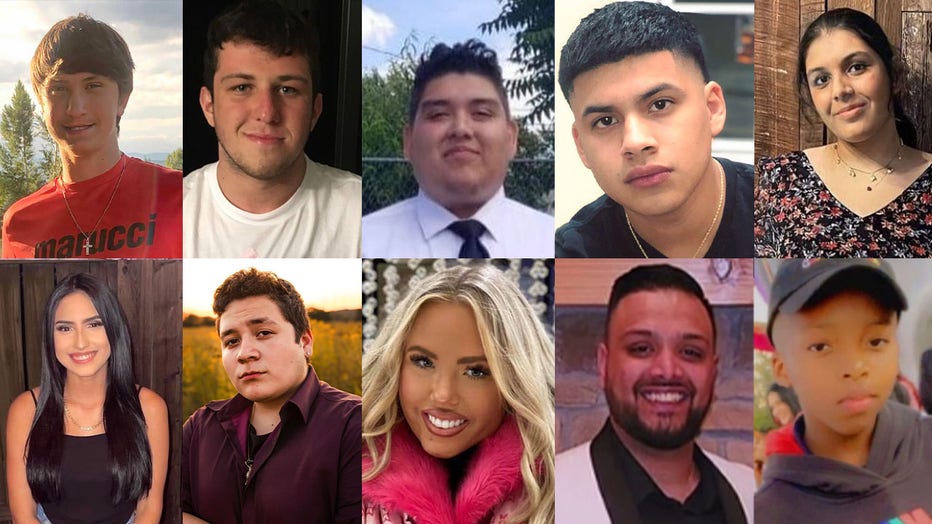10 people died at the Astroworld music festival two years ago. Will anyone be held accountable?

HOUSTON, TEXAS - NOVEMBER 05: Travis Scott performs during 2021 Astroworld Festival at NRG Park on November 05, 2021 in Houston, Texas. (Photo by Erika Goldring/WireImage)
HOUSTON - Nearly two years after 10 people were crushed to death during the deadly 2021 Astroworld festival, no charges have been filed — even though some people, including event workers, expressed safety concerns.
Pinpointing "who exactly caused those deaths is not an easy question to answer," said Sandra Guerra Thompson, a criminal law professor at the University of Houston Law Center.
"It’s a very difficult thing to say, unless you have some kind of clear evidence that somebody in charge, whose job it was to ensure safety and who should have known better, failed to take action," she said.
A nearly 1,300-page report on the investigation into the tragedy released by Houston police Friday said contract worker Reece Wheeler told authorities that he saw a crush of people and warned an event organizer that people could die, shortly before rapper Travis Scott went onstage.
In the report, investigators wrote that Scott said he did see one person near the stage getting medical attention, but said that overall, the crowd seemed to enjoy the show. He said he did not see any signs of serious problems, nor did he hear anyone tell him to stop the show.
Hip-hop artist Drake, who also performed, told police it was difficult to see from the stage what was going on in the crowd and that he didn’t hear anyone call for the show to stop.
Despite no charges being filed, more than 500 lawsuits have been filed over the deaths and injuries at the concert, including many against concert promoter Live Nation and Scott. Some of those suits have since been settled.
Those who were killed ranged in age from 9 to 27, and all 10 people died due to compression asphyxia, according to medical examiners.

NO CHARGES BROUGHT
In June, a Texas grand jury declined to indict six people in the case, including Scott. Prosecutors said, then, that the circumstances of the deaths limited what charges they were able to present, eliminating potential counts such as murder, manslaughter and criminally negligent homicide.
Thompson said the sheer number of people involved in putting on the event, the large scale of it, and the high bar for proving criminal negligence or recklessness are challenges for prosecutors in cases like this.
"It goes back to, who knows what’s going on, is that being communicated?" she said. "Were they being told that people have died, and they still wanted the concert to go on? Or, were they being told that ‘Hey, some people are getting hurt, which might not be that unusual at an event like that?"
Assistant Harris County District Attorney Alycia Harvey said after the grand jury declined to issue indictments that prosecutors were left with only possible counts of endangering a child in connection with the deaths of the two youngest concertgoers, ages 9 and 14.
Scott’s lawyer, Kent Schaffer, has said that the performer was not responsible for the tragedy.
"He never encouraged people to do anything that resulted in other people being hurt," Schaffer said.

Travis Scott performs onstage during the third annual Astroworld Festival at NRG Park on November 5, 2021 in Houston, Texas. (Photo by Rick Kern/Getty Images)
TRAVIS SCOTT’S RESPONSE
Scott has previously said he was unaware of the deaths until after the show. He has since created what he called Project HEAL, a $5 million initiative that includes funding for an effort to address safety challenges for festivals and large-scale events.
The police report said Scott told investigators that around the time Drake came onstage he was told to end the show after the performance, but that no one told him of an emergency.
NEW SAFETY PRACTICES
Following the tragedy, Texas Gov. Greg Abbott formed a task force to study concert safety, and to recommend crowd control and security measures during mass gathering.
The task force in April 2022 reported that people without tickets entered the outdoor festival area hours before the performances began, overwhelming staff and leading to a variety of injuries. It also concluded that the process for issuing permits for mass gatherings is inconsistent statewide.
The task force recommended creating a command center that is authorized to pause or cancel a show in response to safety concerns.
"Sometimes, sadly, industries learn safety practices following disasters," said Thompson, the law professor. "The standards for live concerts like this, I would imagine, are going to change."

